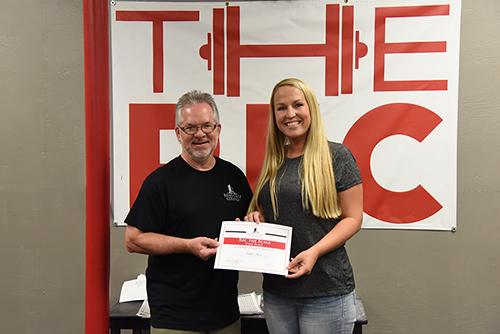RLC’s Natalie Stark Recs the Scale
INA, Ill. – Natalie Stark, Rend Lake College Records Specialist, won the college’s Rec the Scale Challenge earlier this month. The contest is designed to encourage locals and the RLC community to get into shape. Over the 12 weeks, Stark lost nearly 15 percent of her body weight.
Rec the Scale took on 11 participants in January and kept track of the top competitors based on body weight percentage, rather than total pounds lost. It was a tight race at the end, and finishing in second was Amy Epplin, RLC Financial Aid Specialist, and in third was community member Rita Liszewski. In total, all of the participants lost over 175 pounds.
 Stark, RIGHT, poses with Larry Williams, Rec Lab Assistant, LEFT, in The Rec Wednesday morning. Stark will receive a cash prize for placing first in this year’s Rec the Scale Challenge. Click on the image for a larger view.
Stark, RIGHT, poses with Larry Williams, Rec Lab Assistant, LEFT, in The Rec Wednesday morning. Stark will receive a cash prize for placing first in this year’s Rec the Scale Challenge. Click on the image for a larger view.
(ReAnne Palmer / RLC Public Information)
